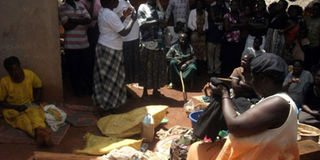Traditional leaders on the spot over increasing torture

Banished. A resident packs her belongings after she was banished from a village on suspicion of practising witchcraft. In many cases, the traditional leaders order more punishments such as caning for such people. FILE PHOTO
What you need to know:
- According to the report, police still remains top of the list of rights violators responsible for 364 cases out of the 834 cases recorded in 2017. The UPDF is second with 57 cases followed by prisons warders with 43 cases. Others are; crime preventers (15), private individual (40), unknown (47) and LRA rebels (37). The Prevention and Prohibition of Torture Act, 2012 criminises torture, with perpetrators being held personally accountable.
GULU. Since colonial time, the security forces have been ranked the number one violators of the human rights in Uganda.
However, a recent survey has indicated there is a new trend where traditional leaders are increasing becoming ‘silent’ violators of human rights.
The new report titled: ‘2017 annual report rhetoric to action’ was released by the African Centre for Rehabilitation of Torture Victims (ACTV) last Friday.
The report reveals that a total of 19 cases of torture out of 834 reported across the country in 2017 were committed by traditional leaders.
The cases in the report were reportedly registered in northern and north-eastern Uganda.
Although security agencies continue to top the list, rights defenders say the involvement of the traditional leaders, whether directly or indirectly in gruesome acts of torture, is worrying since majority of the cases remain undocumented due to cultural believes.
Mr Thomas Okettayot, the ACTV programme manager for Gulu, says majority of the torture cases involving cultural leaders were registered in Lango, Acholi and Karamoja sub-regions.
He explained that cultural leaders normally order illegal punishment of their kinsmen who are suspected to have committed offences that are against the cultural norms, adding that the cases normally go silent.
“Many victims have scars all over their bodies after illegal punishments ordered by cultural leaders,” Mr Okettayot says.
The community liaison officer at Gulu Central Police Station, Mr Moses Ogwang, says some of the torture survivors were beaten during clan meetings and fights over land.
Mr Ogwang notes that in some cases, survivors of torture end up committing suicide after suffering humiliation.
In March, a 46-year-old man identified as Emmanuel Okot, a resident of Bobi Sub-county in Omoro District, committed suicide after he was caned by members of his clan in front of his wife and children.
The Acholi cultural institution’s premier, Mr Ambrose Ola, however, argues that the definition of torture as described by some rights defenders may not mean the same in certain societies where punishment is used to shape the moral behaviour of an individual.
“Culturally, what harms the society or an individual is not accepted and we don’t condone it. But in some instances, there is also no limitation to toleration in the society, especially where the young people are socially defiant and resisting all sorts of moral upbringing, they are subjected to punishment but not torture,” Mr Ola said.
Report
According to the report, police still remains top of the list of rights violators responsible for 364 cases out of the 834 cases recorded in 2017. The UPDF is second with 57 cases followed by prisons warders with 43 cases. Others are; crime preventers (15), private individual (40), unknown (47) and LRA rebels (37). The Prevention and Prohibition of Torture Act, 2012 criminises torture, with perpetrators being held personally accountable.



